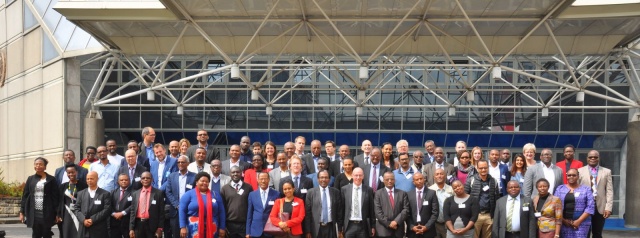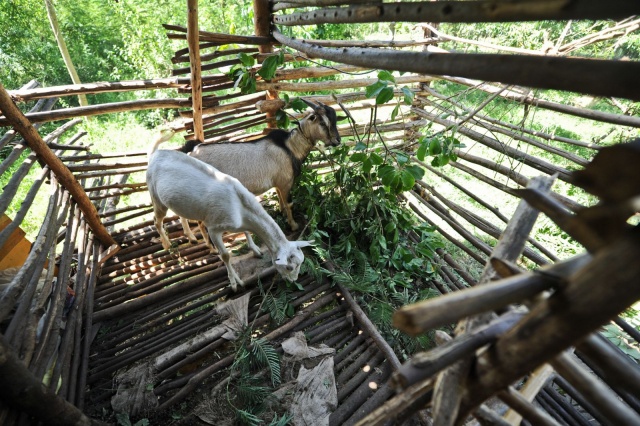Three countries in Eastern Africa join the Global Research Alliance on Agricultural Greenhouse Gases
- From
-
Published on
21.02.19
- Impact Area

Climate change is transforming the planet’s ecosystems and threatening the wellbeing of current and future generations. To keep the increase in global temperature below 2°C and avoid dangerous climate change, reductions in global greenhouse gas (GHG) emissions are urgently required.
Globally, the livestock sector contributes a significant share to anthropogenic GHG emissions, but the sector also has the capacity to deliver a significant share of the necessary mitigation effort. As such, low emissions livestock development offers countries an opportunity to achieve economic gains and respond to climate change simultaneously.
Three Eastern African countries join the Global Research Alliance on Agricultural Greenhouse Gases
African countries are taking ambitious actions towards reducing GHG emissions from agriculture. Ethiopia, Malawi and Uganda are now among the 56 countries and the first three in Eastern Africa who have joined the Global Research Alliance on Agricultural Greenhouse Gases (GRA). This development originates from discussions initiated during the regional awareness raising workshop: ‘Low emissions livestock: Supporting policy-making and implementation through science in East Africa’. The workshop was held at the United Nations Economic Commission for Africa (UNECA) in Addis Ababa, Ethiopia, July 2-4, 2018.

Participants of the regional awareness raising workshop in Addis Ababa. Photo: T. Muchaba (CCAFS)
The workshop focused on livestock production and the reduction of GHG emissions. It was organized jointly by the CGIAR Research Program on Climate Change, Agriculture and Food Security in Eastern Africa (CCAFS-EA), the GRA, the Food and Agriculture Organization of the United Nations (FAO), the World Bank (WB), and the African Climate Policy Centre (ACPC) in collaboration with the governments of Ethiopia and New Zealand.
Transforming livestock stereotypes
Globally, especially in Africa, livestock plays an important role in supporting livelihoods, human health, nutrition and incomes. However, livestock is a major source of agricultural-related GHG emissions and the recent negative perception of the environmental impact of livestock production undermines its development potential.

Goats in Lower Nyando, Kenya, where agricultural interventions are being tested to address climate-related risks. Photo: K. Trautmann (CGIAR)
The GRA, CCAFS as well as national and international partners have been working together to provide practical and science-based support to countries pursuing green growth through livestock. The group is also seeking opportunities to enhance cooperation and investment in research to help reduce GHG emissions from agricultural production. Additionally, the GRA aspires to increase the potential of soil carbon sequestration as well as to improve efficiency, productivity, resilience and adaptive capacity of agricultural production systems.
Members of the GRA aim to deepen and broaden mitigation research efforts across the agricultural sub-sectors of paddy rice, cropping and livestock. Alongside, they coordinate cross-cutting activities across these areas.
Ethiopia, Malawi and Uganda are looking forward to working with other member countries to develop more efficient and sustainable agricultural systems to meet growing global demand for food in the context of a changing climate.
Read more:
News update: Using science to inform low emissions livestock policy development and implementation in East Africa
Related news
-

CGIAR Climate Security team pilots a new research approach for the development of Nature-based Solutions in fragile settings
Ibukun Taiwo27.11.25-
Climate adaptation & mitigation
Responding to complex crises requires new systemic research approaches that help identify entry poin…
Read more -
-

Drones prove their worth in measuring livestock methane in Africa
International Livestock Research Institute (ILRI)26.11.25-
Mitigation
In May 2024, the International Livestock Research Institute (ILRI) and partners shared news of the…
Read more -
-

Pioneer adaptation farmers inspire adoption of climate-smart innovations in Bomet County, Kenya
International Livestock Research Institute (ILRI)24.11.25-
Adaptation
In Bomet County, Kenya, where agricultural traditions run deep, two families and their farms are…
Read more -
